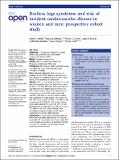| dc.contributor.author | Winter, Anke Christiane | |
| dc.contributor.author | Schürks, Markus | |
| dc.contributor.author | Glynn, Robert J. | |
| dc.contributor.author | Buring, Julie Elizabeth | |
| dc.contributor.author | Gaziano, John Michael | |
| dc.contributor.author | Berger, Klaus | |
| dc.contributor.author | Kurth, Tobias | |
| dc.date.accessioned | 2012-12-07T20:27:34Z | |
| dc.date.issued | 2012 | |
| dc.identifier.citation | Winter, Anke C., Markus Schürks, Robert J. Glynn, Julie E. Buring, J. Michael Gaziano, Klaus Berger, and Tobias Kurth. 2012. Restless legs syndrome and risk of incident cardiovascular disease in women and men: prospective cohort study. BMJ Open 2(2): e000866. | en_US |
| dc.identifier.issn | 2044-6055 | en_US |
| dc.identifier.uri | http://nrs.harvard.edu/urn-3:HUL.InstRepos:10018994 | |
| dc.description.abstract | Objectives: To evaluate the association between restless legs syndrome (RLS) and incident cardiovascular disease (CVD). Design: Prospective cohort study. Setting: Women's Health Study (WHS) and Physicians' Health Study (PHS), USA. Participants: 29,756 female health professionals aged \( \geq 45\) years and 19,182 male physicians aged \( \geq 40\) years at baseline. Main outcome measures: Main outcome was incidence of major CVD; secondary outcomes were first incidence of myocardial infarction, stroke, death due to CVD or coronary revascularisation. Results: 3487 (11.7%) women and 1373 (7.2%) men met International Restless Legs Study Group criteria for RLS. In the WHS 450 major CVD events occurred and 1064 major CVD events were confirmed in the PHS. In both cohorts, RLS was not associated with increased risk of major CVD, stroke, myocardial infarction, CVD death or coronary revascularisation. After adjustment for major vascular risk factors, the HRs (95% CI) for major CVD were 1.15 (0.88 to 1.50) in women and 1.01 (0.81 to 1.25) in men. Highest multivariable-adjusted HRs were 1.29 (0.91 to 1.82) for total stroke in women and 1.22 (0.87 to 1.70) for CVD death in men. Excluding participants with comorbidities potentially leading to RLS did not substantially change the effect estimates. Conclusions: In these large prospective studies of female and male health professionals, RLS was not associated with an increased risk of any incident CVD event. The data do not support the hypothesis that RLS is a marker of increased risk of vascular disease. | en_US |
| dc.language.iso | en_US | en_US |
| dc.publisher | BMJ Group | en_US |
| dc.relation.isversionof | doi:10.1136/bmjopen-2012-000866 | en_US |
| dc.relation.hasversion | http://www.ncbi.nlm.nih.gov/pmc/articles/PMC3312075/pdf/ | en_US |
| dash.license | LAA | |
| dc.title | Restless Legs Syndrome and Risk of Incident Cardiovascular Disease in Women and Men: Prospective Cohort Study | en_US |
| dc.type | Journal Article | en_US |
| dc.description.version | Version of Record | en_US |
| dc.relation.journal | BMJ Open | en_US |
| dash.depositing.author | Kurth, Tobias | |
| dc.date.available | 2012-12-07T20:27:34Z | |
| dc.identifier.doi | 10.1136/bmjopen-2012-000866 | * |
| dash.contributor.affiliated | Winter, Anke Christiane | |
| dash.contributor.affiliated | Kurth, Tobias | |
| dash.contributor.affiliated | Gaziano, John | |
| dash.contributor.affiliated | Glynn, Robert | |
| dash.contributor.affiliated | Buring, Julie | |


